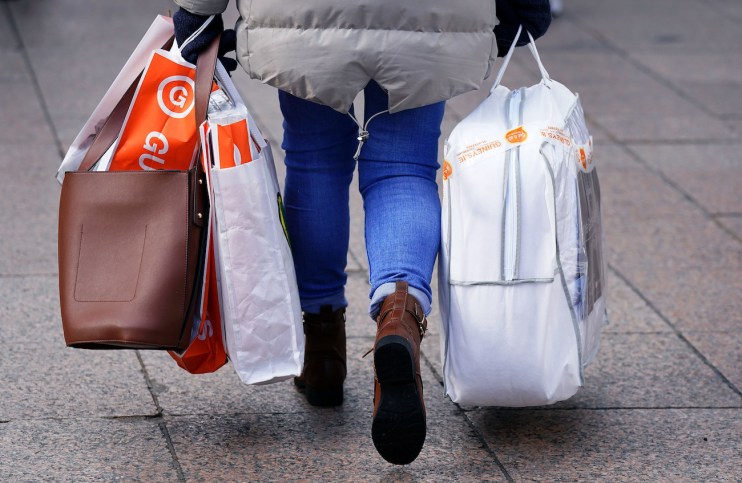UK retail sales’ sluggish new year start as cash-strapped Brits go online to nab deals

UK retail sales remained muted in January following December’s fall, with fuel sales spiking and prices continuing to plummet.
The Office for National Statistics (ONS) released the figures which showed retail sales volumes increased by just half a per cent last month.
This comes after it dipped by 1.2 per cent in December, despite the annual festive shopping rush.
Earlier in the week, it was reported that UK inflation had dropped for the third straight month in a row, as Britain swerved a technical recession – though fears it may still fall into one have no disappeared.
Despite being 0.5 per cent up on December, volumes were still 1.4 per cent down on pre-Covid levels, and 0.9 per cent down in the three months to January overall. Compared to the previous year however, they fell by 5.7 per cent.
The cost of living crisis and energy crisis has continued to weigh down consumer confidence, as millions of Brits tighten their belts and save, instead of spending.
Meanwhile, real pay was revealed to be falling at one of the fastest paces ever this week.
The figures show that food store sales volumes fell by 0.5 per cent in January, building on a drop of 0.7 per cent in the previous month.
The ONS said it continues “to receive feedback that customers were buying less because of increased cost of living and food prices.”
Online retail as the key winner with ’non-store retail’ sales volumes up 2 per cent, after promotions helped consumers get deals.
However, the proportion of retail sales online fell by a significant 25 per cent in January, while remaining significantly above pre-pandemic levels.
Brits did still hit the high street however, with non-food store sales up 0.6 per cent, falling a fall of 2.5 per cent in December. This was attributed to sales promotions, but the ONS reports sales volumes overall were still nearly three per cent down on before Covid-levels.
As the world looks to mark a year since the deadly invasion of Ukraine by Russia, which disrupted the energy market, automotive fuel sales volumes rose by 1.7 per cent.
The spike in fuel sales comes despite prices continuing to fall at the pump, helping to ease the burden on motorists, and its impact on inflation.
Retail sales will continue to decline – say experts
“After December’s steep fall, retail sales picked up slightly in January, although the general trend remains one of decline”, said ONS director of economic statistics Darren Morgan.
“In the latest month, as prices continue to fall at the pumps, fuel sales have risen. Meanwhile, discounting helped boost sales for online retailers as well as jewellers, cosmetic stores and carpet and furnishing shops.
“However, after four months of consecutive growth, clothing store sales fell back sharply.
“Food store sales dipped again with consumers reporting they were selecting lower-priced goods as the increased cost of living and higher food prices continue to bite.”
Responding to the latest ONS Retail Sales Index figures, Helen Dickinson, chief executive of the British Retail Consortium, said: “Widespread January sales helped sales growth remain positive as the industry entered the New Year. Despite this, the rise in consumer spending could not keep up with the double-digit inflation rates, with another fall in retail volumes.
“Larger purchases were hit harder as consumers tightened their purse strings or traded down to value brands. Meanwhile, clothing and footwear saw stronger growth last month.”
“With consumer confidence falling slightly, and high costs throughout the supply chain preventing prices from falling, it is a bumpy road for households. However, retailers are taking steps to cut costs and limit price rises where they can, to help their hard-pressed customers.”
Charlie Huggins, head of equities at Wealth Club said the figures suggested that “while the UK consumer may not be feeling flush with cash, they are still spending. Consumer spending appears to be holding up, at least for now, despite the economic headlines.
“The economic picture is looking a lot less grim than in the Autumn, following the disastrous mini budget.
He added that “Sterling has staged a mini-recovery and mortgage rates have fallen in recent months, despite interest rates going in the other direction. This may have injected some much needed optimism into the UK consumer.
“That said, it is far too early to declare victory. With inflation still eating into consumers’ pockets and many people yet to refinance their mortgages, pressure on retailers could build over the coming months.”
